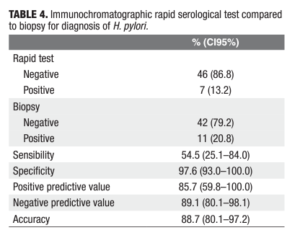HIGHLIGHTS
- Helicobacter pylori infection can cause potentially serious diseases.
- Serological tests are based on the detection of antibodies immunoglobulin G against Helicobacter pylori.
- Serological tests for the diagnosis of Helicobacter pylori infection are low cost tools and have easy application.
- Rapid serological test is a reasonable choice for screening large populations.
ABSTRACT – Background –
Helicobacter pylori infection is widely spread globally and is known to cause potentially serious diseases. Several diagnostic methods exist to identify and treat carriers of this bacterium. Serological tests for the diagnosis of infection are based on the detection of antibodies immunoglobulin G against H. pylori, a non-invasive, inexpensive, and easy-to-perform option. Objective – This research aims to ascertain the accuracy of an immunochromatographic serological test to verify the feasibility of using this method in patients who have not undergone previous eradication therapy. Methods – Rapid tests and questionnaires were applied to 53 patients that underwent upper digestive endoscopy with research for H. pylori between the period of September and October 2021. The results were compared with histopathology. Results – In the rapid tests, seven positive and 46 negative results were obtained. When compared with the gold standard, the following values were described: sensitivity 54.5%, specificity 97.6%, positive predictive value 85.7%, and negative predictive value 89.1%. Conclusion – In the present study, the immunochromatographic serological tests had an accuracy close to the values found in other similar studies. Therefore, it may be concluded that the rapid serological test remains a reasonable choice for screening large populations due to its low cost and ease of application, especially in those individuals who have not undergone previous treatment.
AUTORES
Gianluca Z ROVARIS, João V BACK, Maria Paula RONCHI-COLOMBO, Vitória S ROSA, Manoel C B CARDOSO and Emilio C BERGER.


